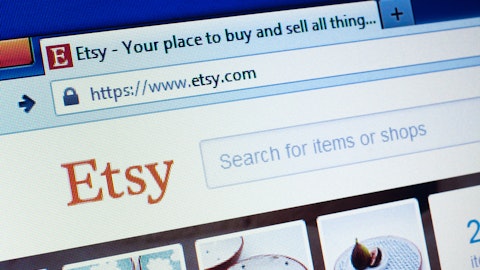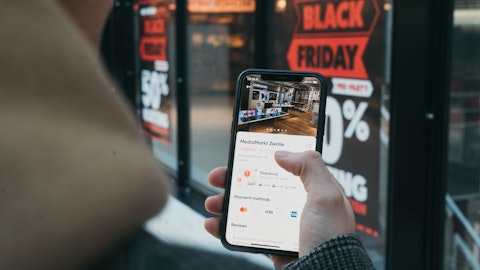So that’s very exciting. At Depop, first, Kruti and the team have done a really good job of accelerating product velocity with using a lot more data to determine which parts of what they’re launching are working. So that’s really core to the Etsy playbook. We talked about this in our prepared remarks. Having the team broken down into small squads that each work very independently and very urgently to fix a customer problem and measure every launch they do is that actually making the customer experience better in a way that’s driving more GMS. So we’ve been successfully installing that playbook, and velocity of the team at Depop is up substantially. Similar to Reverb, actually, affordability is a big area that they are working on and making sure that sellers are selling items at prices that feel good to buyers.
The competitive landscape for Depop is more challenging. Right now, there is a lot of competition in the recycled clothing market. And the U.K. economy has been a headwind. It’s no secret that the things are tougher and discretionary spending in the U.K. economy is tight. So those have been headwinds for Depop. But they are, I think, focused on exactly the right things. With making sure the customer experience continues to be world-class, making sure the brand continues to be a leading brand. Investing also in the U.S. where we’re a huge market opportunity, much earlier for Depop, where we see some encouraging trends. And that team will keep focused as we do with all of our brands on profitable growth, doing things that drive profitable growth.
And last but not least, Elo7. Elo7 is more weighted to events and activities than the other Etsy brands. So for example, having pinatas or having birthday parties or weddings, things like that. And so as they come through COVID in Brazil, we think that’s going to provide tailwinds for them to continue driving the Elo7 business in Brazil.
Debra Wasser: Rachel, do you want to just touch on the profitability question?
Rachel Glaser: Yes. Just — I think the second part of the question was just on getting profitability through those subsidiaries. And first, I just want to remind you that the subsidiaries are 12% or less of our total GMS. So they’re very, very small. Reverb is just at about hovering around breakeven. Elo7 is not yet profitable, but they’re also too tiny to matter or make any kind of material impact to our overall margins. And Depop, we’re investing for growth. It would be really the wrong thing to do to starve them at this point. But I will also say, even if they were all three breakeven or better, they would still be dilutive to our margins at this point just because they’re all subscale, and so their margins would be lower. And when you factor that into Etsy’s very high margins, it just brings them down by a bit.
Debra Wasser: Thanks, Rachel. I know we’re out of time, but we’re going to squeeze in one more because we want to get to it. We got a question from Sean Dunlop at Morningstar, and it’s really just about how — what we’re seeing in India. And can we talk about the early results and the road map from here, Josh, especially getting it to be going from a one-sided marketplace to two-sided?





